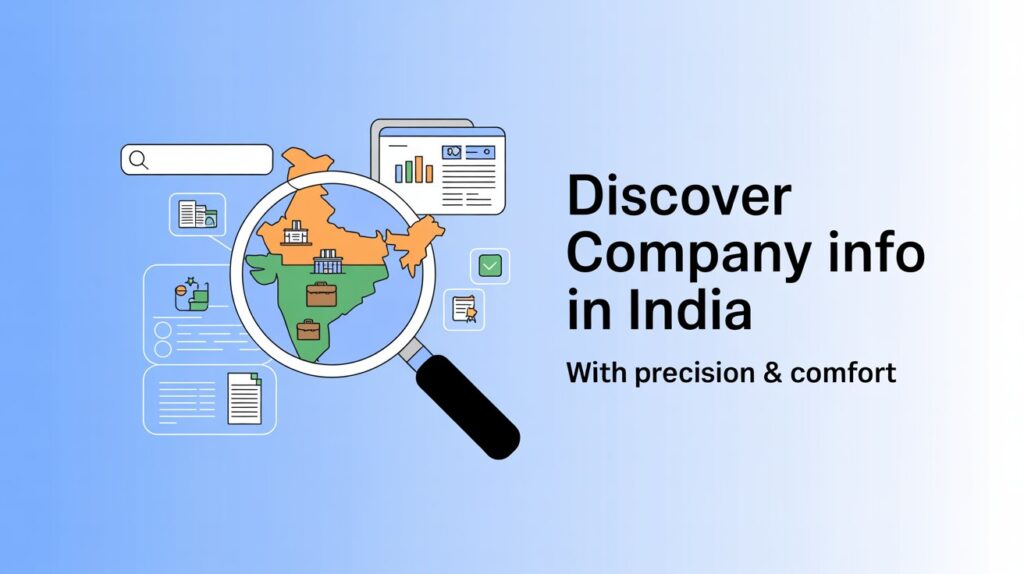The contemporary business environment does not permit data to be optional. As a seller, shareholder, service provider or any other individual, understanding the history of a business firm can be the difference between an opportunity and a time bomb. India has thousands of registered companies that are operating in different industries, such as IT and manufacturing, logistics, and finance. When you are in need of searching a specific company information in India, you must know where to start and what Company Details Website is the one where you will find the authoritative data and information.
Where can you get Confirmed Company Information in India?
Indian business information is controlled and archived under government and legally registered institutions. Ministry of Corporate Affairs (MCA) is the most reliable official government site, where official company information can be obtained. Using its portal, you can also search registered companies by name or Corporate Identification Number (CIN). The registration number, date of incorporation, company status, directors details and balance sheet filing status are accessible to the public. A number of data aggregators, personal databases, and professional service platforms also gather data on multiple government sources on behalf of the government and ensure their user-friendly presentation. They tend to merge MCA, GST registration records, court filings, and trademark registries. This classifies them as appropriate in risk assessment, B2B collaboration, and user-created content validity. Use only the sources that originate in regulatory bodies. Moreover, it is important to keep the information current at all times. The change in profiles of companies can occur fast in a merger, acquisition, or any legal action, and, when you have to check the directors, the authorized signatories, or financial filings, it is a good idea to compare the information in more sources than one. In addition, requesting audited reports via official contacts to the companies which are not listed publicly.
What kinds of company information are publicly available?
A line exists between business information that is public and confidential information. In India, compliance filings and regulatory disclosures make a number of details about a company publicly available. Besides, the date of incorporation, type of registration (private limited, LLP, public limited), authorized capital, paid-up capital and the registered office address also fall under the category of public records. This assists in determining the leadership of a company. Another important source is stakeholders being able to assess the credibility of promoters and decision-makers, particularly those who had prior ties with other companies. These are profit and loss, balance sheets, and audit reports. This data is typically used by analysts and prospective investors to identify growth, evaluate liabilities and the scale of operation. Such insights may be useful in evaluating the reliability of the business, particularly to suppliers and creditors who must determine the ability to repay. Although this information can be obtained through independent subscriptions, it offers a vital risk appraisal feature during the planning of strategic partnerships or a transaction.
What Can Professionals do with this Data to make Strategic Decisions?
Legal formality is not all about company information. Access to real-time and precise company data can help in the making of informed decisions in the workplace. An example of this would be Procurement teams relying on company profiles to assess new vendors and financial institutions relying on registration and compliance history to assess the credibility of the borrower. When a director history is changed, there is an abrupt shift in the capital, or the back-to-back registration of related entities, it is often an indication that they should be looked into more carefully. Once this information is reconciled with operational inputs, the professionals can create a more organized risk matrix of partnerships or service agreements. Equity analysts can use ratios, growth in revenues, and liabilities to compare them with fellow companies operating in the same industry. Availability of standard public company information makes it possible to evaluate it consistently, which is important in regulated markets such as banking and insurance. They can use size, location or sector filters to narrow down the companies to which they can target a campaign or solution. The result is an increase in participation rates and more effective distribution of sales resources. The absence of filings, settlements, continued cases, or regulatory fines are alarm bells. Early identification of those can help companies avoid legal losses and a damaged reputation. That is why company data becomes a preventative, not only a reactive, tool.
Conclusions: Are You Ready to Find Company Information in the whole of India?
It is now easier than ever to find company details across India whether you are looking to enter a new partnership, analyzing a potential customer, or performing risk assessment. Having official portals and data intelligence platforms at the tip of your fingers, all that you need is an effective approach. And with reliability, regulatory sources and up to date data, professionals can be ahead of the game every time you are called on.

